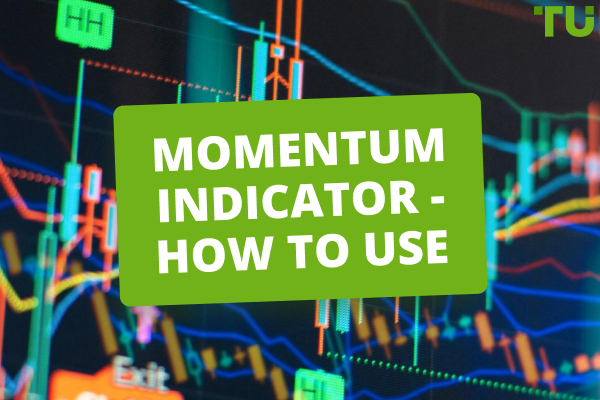Best Stocks of Environmentally Friendly Companies
The 9 best green stocks to invest in a sustainable future are
-
1
Clearway Energy – Strong track record of profitability and dividend growth.
-
2
Watts Water Technologies – One of the leaders in the manufacturing of plumbing, heating, and water-quality products.
-
3
Ecopro BM – Korean battery materials company poised to benefit from growing demand for lithium-ion batteries.
-
4
Enphase Energy – One of the leading providers of microinverters for solar panels.
-
5
NextEra Energy – One of the major players in the renewable energy sector.
-
6
Sunrun – One of the leaders in the residential solar and energy storage sector.
-
7
Albemarle Corporation – Among the major producer of lithium-ion batteries.
-
8
Brookfield Renewable Partners LP – Renewable energy company with a diversified portfolio of assets.
-
9
First Solar Inc. – Leading manufacturer of solar panels.
We have transitioned into a world where people are becoming increasingly aware of the importance of protecting the environment. In such a scenario, investing in a sustainable way is no longer just a choice you can make; it's something that has become essential.
In this article the experts at TU will showcase the top 9 companies that are not only good for the environment, but also promising when it comes to making money. They are often known as "green stocks" – firms that put both wallets and the Earth first. These companies believe in earning money yet still making our world cleaner and more green for every person. Before we proceed, do note that as with any investment, there are risks and uncertainties to be aware of when investing in green stocks, and consulting with a financial advisor is advisable.
What are green and environmental stocks?
Green and environmental stocks are investment opportunities that aims for financial returns along with prioritizing the well-being of the planet. These stocks are associated with companies or funds that actively work towards reducing harmful pollutants, conserving resources, and promoting sustainability. In other words, they invest in businesses that make the world a greener and more eco-friendly place.
Green investing includes many different areas, making it varied and full of change for investors. This can be renewable energy (like wind and solar energy), green transportation (like electric cars), controlling pollution, cutting down waste, and improving water systems. Read also: Top EV Battery Stocks to Invest in the TU article.
Top sustainable companies to invest in
| Stock | Symbol | Industry | Location | Market Cap | P/E Ratio | Dividend Yield |
|---|---|---|---|---|---|---|
Clearway Energy |
CWEN |
Renewable energy |
United States |
$4.448 billion |
48.98 |
6.93% |
|
Watts Water Technologies Inc. |
WTS |
Plumbing, heating, and water-quality products |
United States |
$6.164 billion |
22.53 |
0.76% |
|
Ecopro BM Co. Ltd. |
247540. |
Battery materials |
South Korea |
₩22.48 trillion |
110.58 |
0.15% |
|
Enphase Energy, Inc. |
ENPH |
Clean energy technology |
United States |
$10.557 billion |
19.38 |
0.00% |
|
NextEra Energy Inc. |
NEE |
Renewable energy |
United States |
$120.31 billion |
15.73 |
3.15% |
|
Sunrun |
RUN |
Residential solar and energy storage |
United States |
$2.201 billion |
22.95 |
0.00% |
|
Ormat |
ORA |
Renewable energy |
United States |
$3.905 billion |
42.08 |
0.73% |
|
Solar Edge |
SEDG |
Solar energy |
Canada |
$3.928 billion |
20.7 |
3.10% |
|
First Solar Inc. |
FSLR |
Solar energy |
United States |
$15.729 billion |
33.31 |
0.00% |
1. Clearway Energy (Ticker: CWEN)

Historical Price Chart of Clearway Energy
Clearway Energy, listed on the NYSE as CWEN, is a major owner of renewable energy-generating facilities in the United States. Alongside its wind and solar energy asset, the company also operates highly efficient facilities running on natural gas. Clearway generates steady cash flow by selling its power through power purchase agreements (PPAs).
In 2022, the company sold its thermal business which resulted in cash proceeds of $1.35 billion. This financial boost was allocated to expanding Clearway's renewable energy ventures, marked by various acquisitions. These acquisitions expanded its portfolio and also increased its ability to raise dividends. Clearway also reported US$112 million in renewable income in Q3 2023 financials.
Clearway Energy now foresees the potential to increase its dividend, aiming for the upper limit of its annual growth target range, set between 5% and 8%, at least until 2026. The company also intends to uphold a strong financial standing. With its ongoing efforts in expanding its renewable energy operations, Clearway Energy is in a great position to create substantial value for its shareholders in the upcoming years.
2. Watts Water Technologies Inc. (Ticker: WTS)
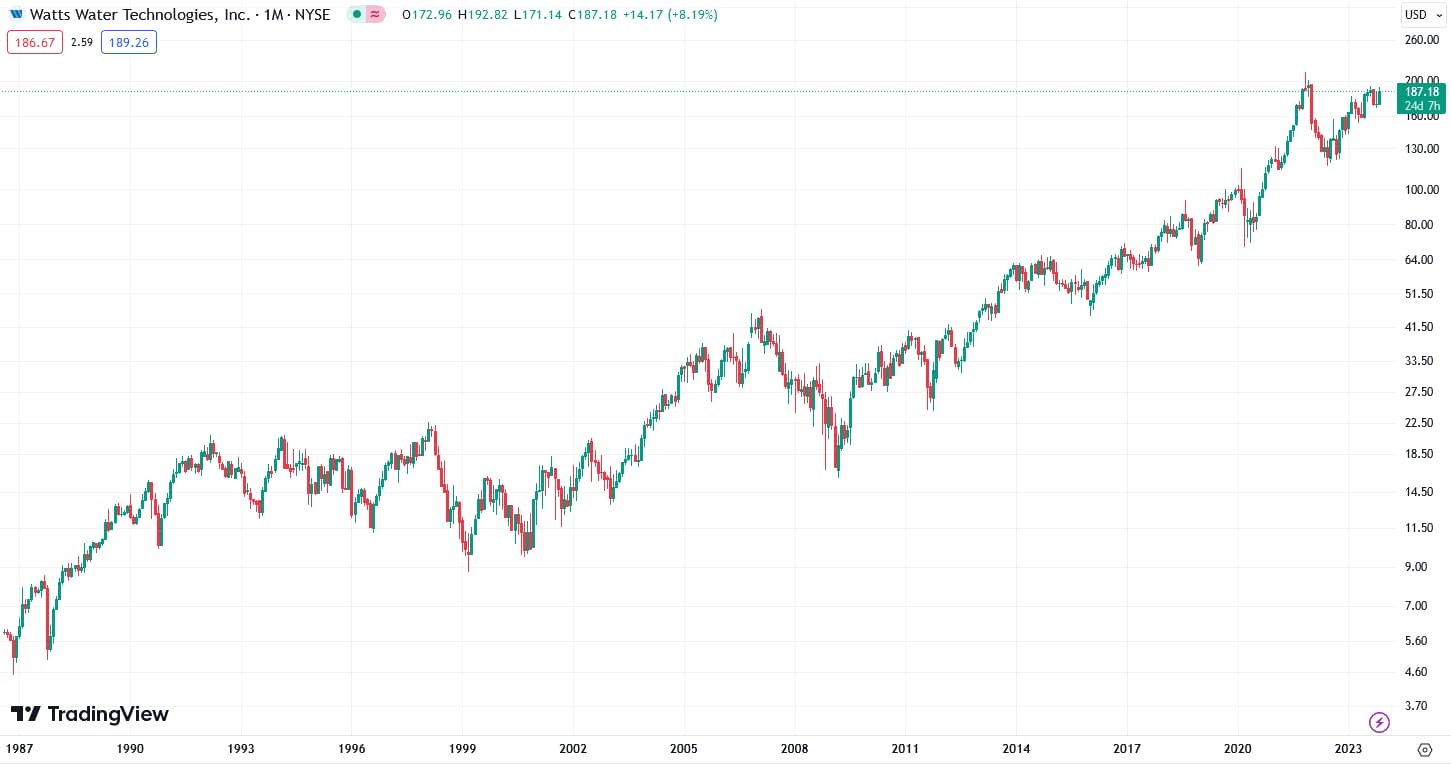
Historical Price Chart of Watts Water Technologies Inc.
Watts Water Technologies manufactures plumbing, heating, and water-quality products for various customer segments, including residential, industrial, municipal, and commercial users. The company's pressure-reducing valves contribute to water conservation on a global scale, saving over 19 billion gallons of water annually. Additionally, their high-efficiency gas-fired boilers and water heaters have helped customers reduce carbon emissions by more than 100,000 metric tons in the previous year. Maybe, you can also be interested in information about the best carbon capture technology stocks.
Recently, the company reported robust third-quarter 2023 results, with sales reaching $504 million, a 3% increase compared to the previous year. The company achieved an 80-basis point rise in the reported operating margin and a substantial 120 basis point increase in the adjusted operating margin, primarily due to favorable price realization, product mix, and productivity.
Earnings per share (EPS) also saw impressive growth, with reported EPS up by 12% to $1.96 and adjusted EPS increasing by 14% to $2.04. This strong financial performance was attributed to a dedicated team and solid cash flow.
The acquisition of Bradley Corporation in October 2023 was a strategic move that expanded the company's market reach and growth potential. Watts Water Technologies expressed confidence in its financial outlook by raising its full-year 2023 adjusted operating margin expectations.
3. Ecopro BM Co. Ltd. (Ticker: 247540.KQ)

Historical Price Chart of Ecopro BM Co. Ltd.
Ecopro BM Co. Ltd. is a Korean battery materials company that holds a significant position in both MASGX and KARS funds, ranking as the eighth-largest holding in MASGX and the fifteenth-largest holding in KARS.
Ecopro is favored for its capability to manufacture high-quality products crucial for achieving greater battery densities and extended driving ranges. The company's emphasis on environmentally friendly practices positions it well for success, and it can perform just as impressively as firms without an explicit environmental focus.
According to experts, businesses that are of high quality and focused on long-term sustainability while addressing global environmental challenges tend to benefit from evolving regulations and shifting societal preferences, resulting in enduring growth prospects. Notably, Ecopro's shares have shown remarkable performance, registering a substantial gain of 202.9% in the year 2023.
4. Enphase Energy, Inc. (Ticker: ENPH)
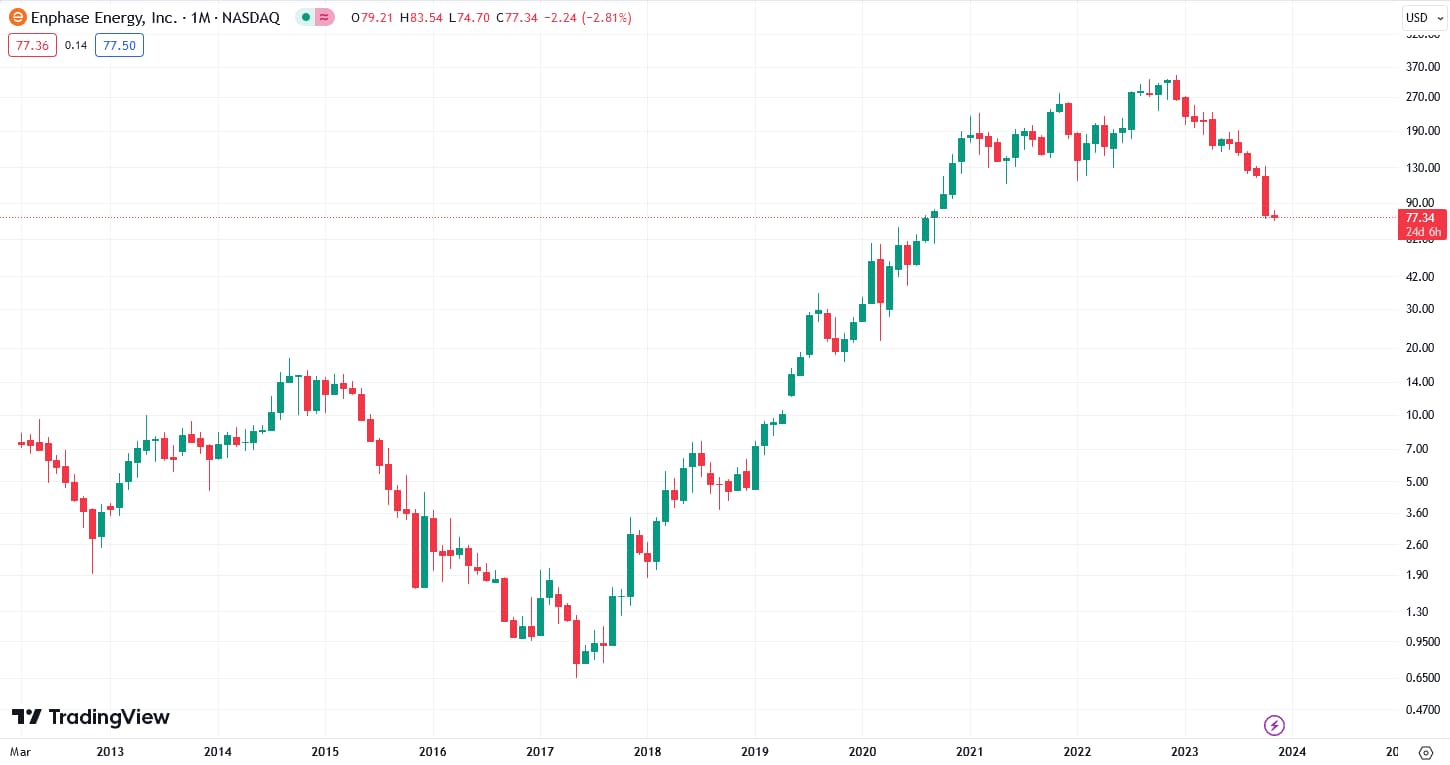
Historical Price Chart of Enphase Energy Inc.
Enphase Energy Inc., having its headquarters in California, is a specialist in clean energy technology. They offer various products like solar micro-inverters, EV charging stations, and energy storage solutions. Enphase is a leader in its field, with a global presence in over 140 countries, making it a strong contender among clean energy stocks.
Many experts and their research pointed out the company's potential benefits from share repurchases, growth in the European solar market, and a clear resurgence in U.S. residential solar installations. In the second quarter of 2023, 50 hedge funds were optimistic about Enphase Energy's prospects. Among them, Coatue Management, led by Philippe Laffont, was the top shareholder, with stakes valued at approximately $102.5 million.
Despite short-term concerns about U.S. residential solar installation growth, the company holds a strong position in microinverters and is well-positioned to benefit from the ongoing trend of solar adoption. Enphase is also expanding internationally and introducing new products to fuel its growth.
5. NextEra Energy Inc. (Ticker: NEE)
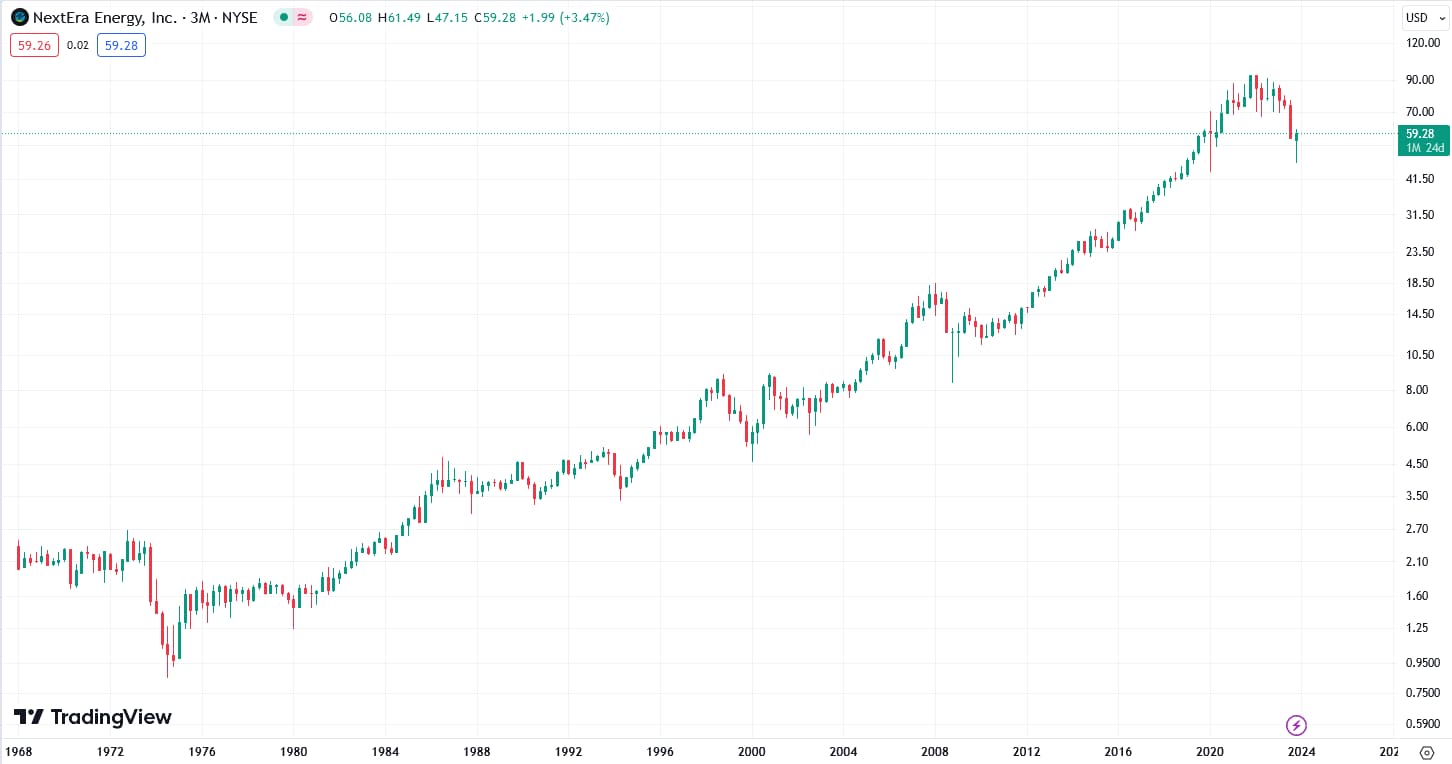
Historical Price Chart of NextEra Energy Inc.
NextEra Energy Inc. is a major player in the renewable energy sector, particularly in the fields of solar and wind power generation. Many investors see a compelling buy opportunity in this stock for several reasons. Firstly, the company achieved a remarkable 10.6% year-over-year growth and 11% year-to-date growth in adjusted EPS for the third quarter, marking its financial stability and profitability. In addition, its subsidiary, FPL, increased earnings per share and grew regulatory capital employed by approximately 13.6% compared to the same quarter last year, demonstrating substantial growth prospects.
Moreover, NextEra's Energy Resources division experienced a significant 21% growth in adjusted earnings, primarily driven by robust contributions from new renewable investments. The company added approximately 3,245 MW of new renewables and storage to its backlog, which now stands at an impressive 21 GW, after placing 1,025 MW into service since the last quarter's call. This substantial pipeline of renewable projects positions NextEra Energy as a key player in the growing green energy sector.
In the recent board meeting, the NextEra Energy board highlighted the company's strategic initiatives to navigate challenges, such as rising interest rates. With a focus on expanding their renewables portfolio and maintaining low costs, NextEra Energy appears well-positioned for future growth.
6. Sunrun (Ticker: RUN)
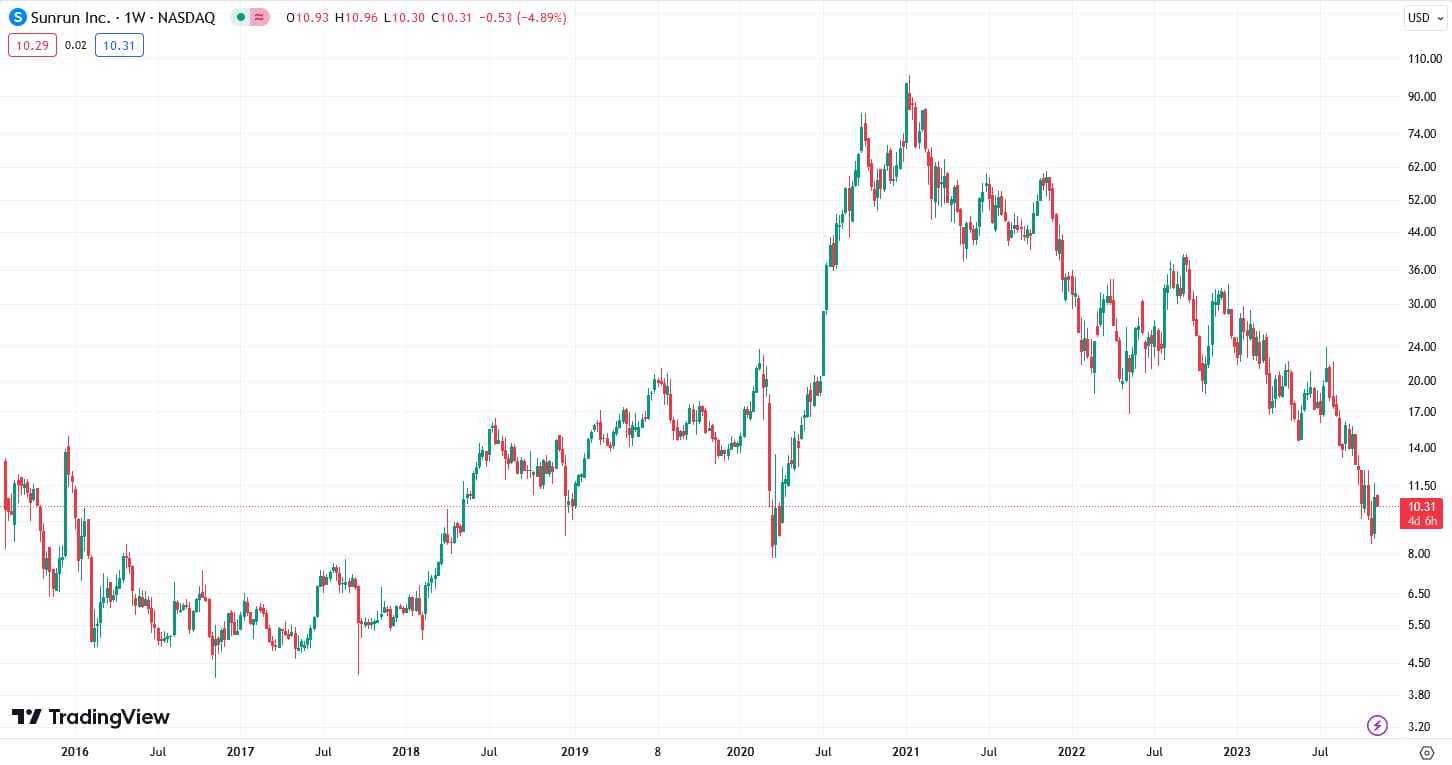
Historical Price Chart of Sunrun
Sunrun, a prominent company based in San Francisco with a net worth of $1.92B, is a leader in the residential solar and energy storage sector in the United States. They enable homeowners to produce and store clean energy, playing a significant role in advancing the shift towards a more decentralized and sustainable energy system.
The recent $1.2 billion write-down on the acquisition of Vivint Solar, while reflecting challenges, is also being seen as a potential opportunity for value investors. The rationale is that Sunrun's stock price may have been discounted, making it an attractive entry point for those who believe in its long-term prospects.
7. Ormat Technologies (Ticker: ORA)
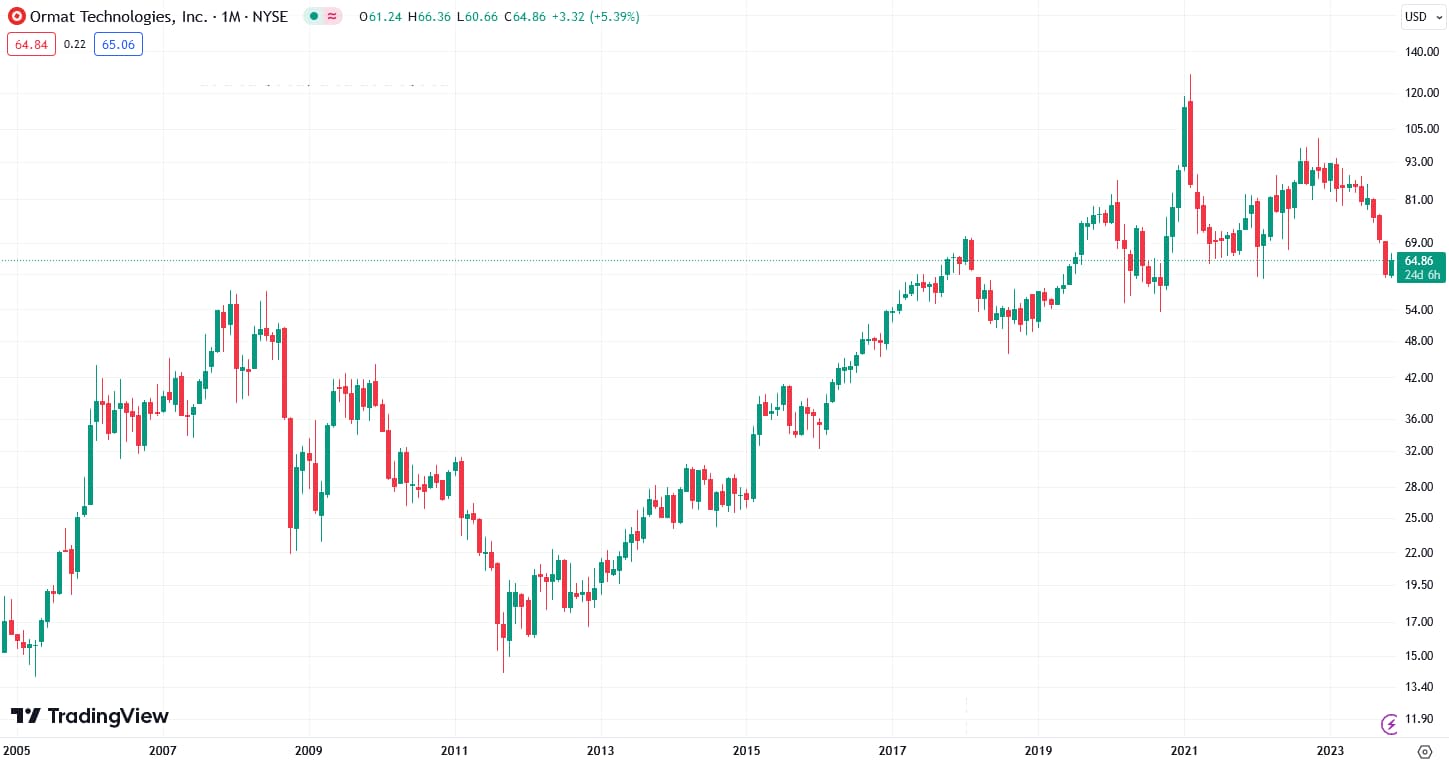
Historical Price Chart of Ormat Technologies
Ormat Technologies focuses on creating electricity using eco-friendly methods. They have power plants in different parts of the world, like the United States, Kenya, Guatemala, Guadeloupe, and Indonesia. These power plants use special technology to generate electricity in a clean and sustainable way.
Recently, they have also announced a significant acquisition. They are set to purchase a portfolio of assets from Enel Green Power North America, including geothermal and solar power plants, with a total generation capacity of about 150 MW. The acquisition, totalling $271 million, is expected to be finalized by the first quarter of 2024, pending regulatory approvals.
These assets include operating geothermal power plants, solar assets, and greenfield development projects, collectively generating an annual revenue of approximately $35 million. Ormat has plans to optimize and expand these assets, aiming to enhance their efficiency and output, which will result in added revenue. This acquisition not only contributes to Ormat's growth but also aligns with their commitment to environmental sustainability, further bolstering their position in the renewable energy sector.
8. SolarEdge Technologies, Inc. (Ticker: SEDG)
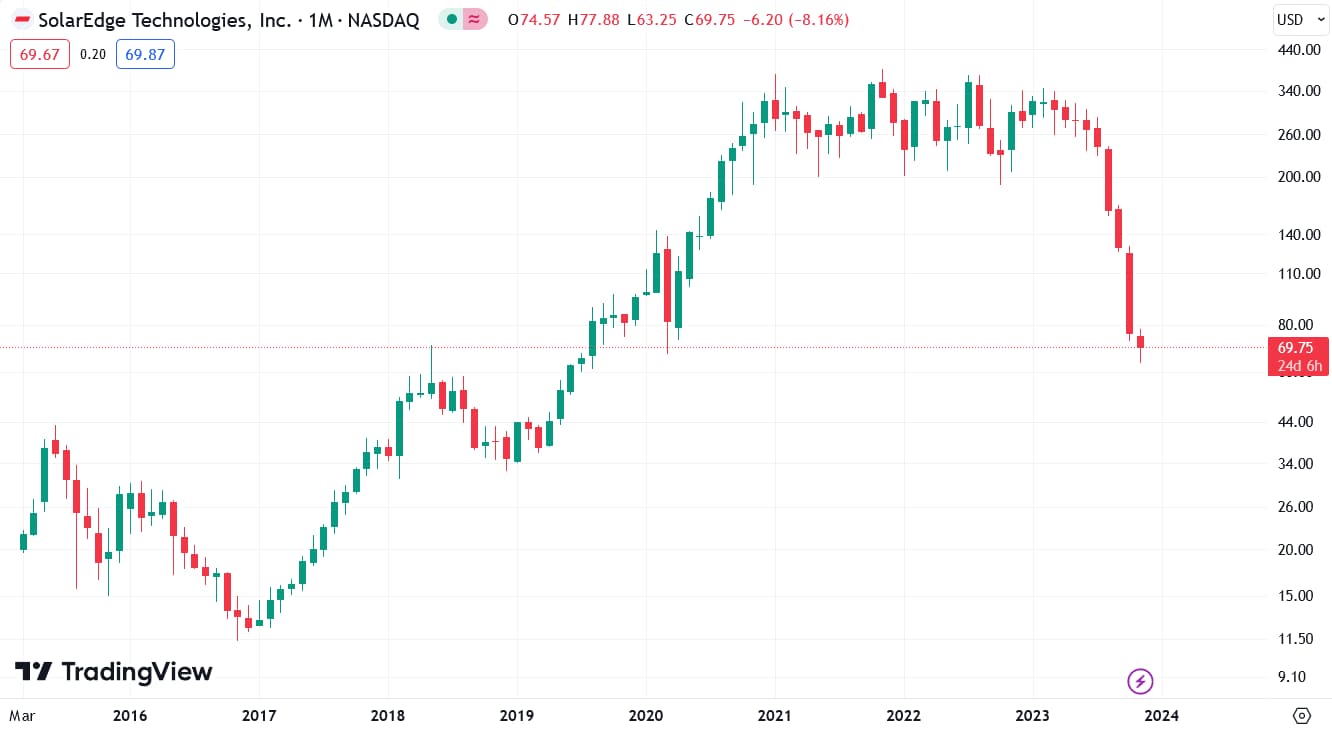
Historical Price Chart of SolarEdge Technologies Inc.
SolarEdge Technologies, Inc. is an Israeli solar technology company known for its solar inverters, optimizers, and energy management systems. Founded in 2006, it played a pioneering role in developing a DC optimized inverter system and successfully commercializing Power Optimizers. As a result, it is considered one of the top clean energy stocks.
SolarEdge has a broad product offering, including inverters and batteries. Such diversification helps the company navigate market fluctuations and adapt to shifting customer preferences. Additionally, its 121 MWh of batteries shipped in the third quarter suggests growing interest in energy storage solutions.
Zvi Lando, the CEO of SolarEdge, addressed the company's recent performance for the third quarter, acknowledging that it fell short of their initial expectations. This was primarily due to a sluggish market environment, resulting in an elevated inventory of their products in distribution channels, particularly in Europe. However, Lando expressed optimism about the future of the solar photovoltaic (PV) industry. He emphasized the company's confidence in their leading technology, global presence, and diverse product offerings, which position them as a frontrunner in this market.
In light of SolarEdge's strong technology and global reach, this could be seen as an opportunity to consider buying their stock, especially with the expectation of inventory clearing in the coming quarters and the company's positive outlook on the solar PV industry's future.
9. First Solar (Ticker: FSLR)
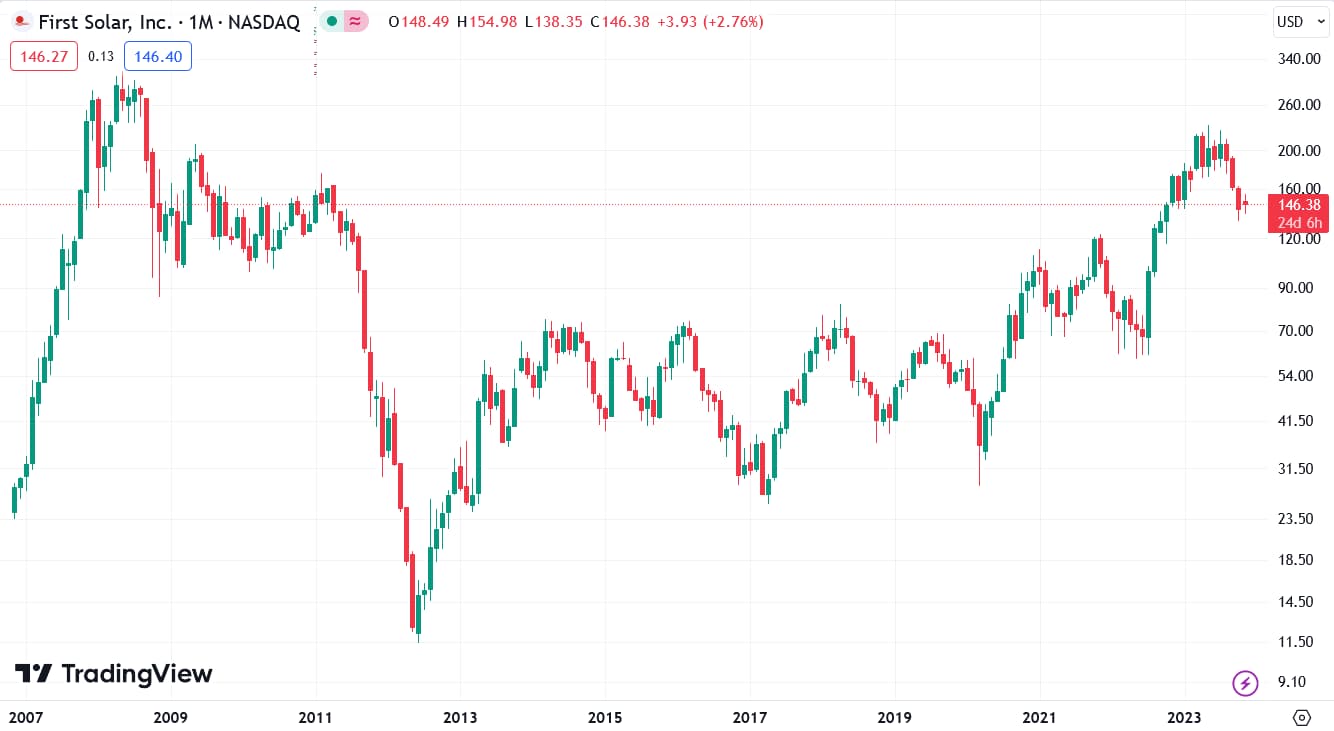
Historical Price Chart of First Solar
First Solar, traded on the NASDAQ as FSLR, specializes in the development and production of thin-film solar panels renowned for their large size, enabling them to generate more energy compared to competing technologies. This makes First Solar particularly well-suited for utility-scale solar energy projects.
As a prominent global solar panel manufacturer, the company is excellently positioned to cater to the surging demand for solar panels. First Solar is actively investing to expand its production capacity to meet this demand. By the first quarter of 2023, it had secured contracts for panel sales extending up to 2029, granting substantial visibility into future revenue.
Despite substantial investments in new manufacturing capacity, the company expected to conclude 2023 with a net cash reserve ranging from $1.2 billion to $1.5 billion. This financial stability allows for great flexibility in pursuing expansion opportunities to harness the growing demand for solar panels.
Furthermore, First Solar is dedicated to enhancing its technological capabilities through strategic acquisitions. For instance, in 2023, it acquired Evolar, a leading European thin-film company, to strengthen its capacity for developing next-generation solar technology.
How to choose sustainable stocks
For any impact investor, selecting sustainable green stocks is imperative. On similar though, the experts have explored the key aspects to consider when making environmentally and socially responsible investment decisions
Innovation and technology
-
Seek companies investing in innovative technologies or sustainable practices that can drive industry advancements.
-
Evaluate R&D expenditures directed toward environmental innovation.
Long-term viability
-
Consider how the company may weather economic, environmental, and social challenges.
-
Examine scalability to determine if the company can grow its green initiatives and expand its impact.
Assessing financial health and performance
-
Examine historical and projected sales and profit trends.
-
Judge the company's ability to generate profits in relation to its revenue and costs.
-
Assess the company's fiscal soundness by comparing debt to shareholder equity.
-
Judge the stock's price in relation to its earnings per share.
Considering environmental, social, and governance (ESG) factors
-
Focusing on the company's actions to minimize environmental harm and advance sustainability.
-
Weighing the company's dedication to ethical practices, labour fairness, community involvement, and societal contributions.
-
Investigating the company's management structure, board composition, and transparency in decision-making.
Assessing growth potential and risks
-
Measuring the company's capacity for growth and recognizing potential challenges or uncertainties.
Understanding the regulatory landscape
-
Judging how government regulations, incentives, and policy shifts affect the company's operations and growth potential.
Best Stock brokers


Building a sustainable investment portfolio
Creating a sustainable investment portfolio is like putting together a mix of investments that align with your financial goals and make a positive impact on the environment and society. Experts have broken this process down into the following key areas
Diversification strategies for sustainability
Balancing Asset Allocation
Set clear investment objectives, assess your risk tolerance, and establish your return expectations. Specifically, align your investment choices with your sustainable goals.
Spreading Risk with Diversification
By spreading your investments across different asset classes and sectors, you can not only reduce risk but also strike a harmonious balance between your ESG aspirations and your financial goals.
Strategic and Tactical Allocation
The blend of strategic allocation (long-term targets) and tactical allocation (short-term adjustments) can help you adapt your portfolio based on market conditions and evolving ESG developments, making the most of opportunities while adeptly managing market fluctuations.
Security selection
ESG Screening
Negative screening allows you to exclude companies or sectors with subpar ESG performance, while positive screening helps you cherry-pick companies with robust ESG track records.
ESG Integration
Incorporate ESG factors into traditional financial analysis. By doing so, you unearth potential risks and opportunities tethered to ESG issues that could sway a company's long-term performance.
Best-in-Class Approach
Embrace the best-in-class approach by cherry-picking companies that lead the pack in ESG performance within their respective industry. This strategy enables you to maintain sector diversification while throwing your weight behind sustainability leaders.
Thematic Investing
Whether the theme you choose is clean energy, gender diversity, or water scarcity, this approach allows you to seize opportunities arising from global sustainability challenges.
Risk management and portfolio monitoring
Rebalancing Frequency
Whether you opt for annual or semi-annual adjustments depends on your investment objectives and market conditions. Regular rebalancing ensures that your portfolio stays in sync with your desired risk and return profile.
Thresholds
Predefine limits for deviations in asset allocation. When a particular asset class exceeds the threshold, it's time to rebalance your portfolio to restore its target allocation. This keeps your portfolio's risk and return equilibrium intact.
Ongoing ESG Evaluation
Regularly monitor your portfolio's ESG performance, as companies' ESG scores and sustainability practices can evolve over time, potentially impacting your investments.
Green companies benefits and risks
Investing in green companies brings a lot of benefits along with risks. Experts have discussed below the benefits and risks associated with this type of investment.
👍 Benefits of investing in energy stocks
• Global Economic Relevance - Energy is a fundamental sector, contributing trillions of dollars to the global economy. It plays a crucial role in sustaining economic activities, ensuring a consistent, long-term demand.
• Potential for High Returns - Energy companies can reap higher profits when energy prices increase, often leading to increased dividends for investors or investments in future growth.
• Growing Global Demand - Developing countries like China and India are driving increased energy demand, providing ongoing opportunities in both traditional energy sources (oil and gas) and renewable energy.
• Diverse Investment Opportunities - Energy stocks cover a wide spectrum, including fossil fuels and clean energy sources like solar and wind, offering diverse investment choices.
• Post Recession Rebound - With the world recovering from economic downturns, there's potential for a surge in travel and economic activity, which can boost energy demand and prices.
👎 Risks of investing in energy stocks
• Environmental Concerns - Energy companies are associated with greenhouse gas emissions and environmental issues, potentially leading to costly lawsuits and ethical concerns.
• Price Volatility - Energy prices are influenced by global economic conditions and geopolitics, resulting in rapid and unpredictable price fluctuations, making the sector riskier.
• Capital Intensive - Energy investments require substantial capital for exploration and research into new energy sources. If these investments do not yield expected returns, it can negatively affect long-term performance.
• Regulatory Risks - Governments are increasingly implementing regulations to combat climate change, affecting traditional energy companies. Green energy companies also face risks related to changing subsidies and policies.
• Technological Shifts - Advances in cleaner energy technologies can reduce the demand for traditional energy sources, potentially impacting the value and sustainability of these companies. Staying informed about these technological shifts is vital for investors.
Summary
Investing in green stocks is a smart move for both your financial future and the planet. These companies are not only making a positive impact on the environment but also offer potential financial gains for investors. It's a win-win situation where your investments can align with eco-conscious values while potentially providing good returns. So, if you're looking to invest your money in a way that's not only financially savvy but also environmentally responsible, consider exploring green stocks and building a sustainable investment portfolio. It's a step toward a greener and more sustainable future for all of us.
FAQs
What are green and environmental stocks, and how do they contribute to a sustainable future?
Green and environmental stocks are investments in companies or funds that prioritize reducing pollution, conserving resources, and promoting sustainability. These companies work towards making the world a greener and more eco-friendly place through sectors like renewable energy, green transportation, pollution control, and more.
How do I choose the best sustainable companies for my investment portfolio?
When choosing sustainable companies for your investment portfolio, consider factors like their commitment to innovation and technology, long-term viability, financial health and performance, ESG (Environmental, Social, and Governance) factors, market standing, growth potential, and the regulatory landscape.
Is investing in sustainability stocks a wise strategy for long-term growth and environmental stewardship?
Yes, investing in sustainability stocks aligns your investments with eco-conscious values and has the potential for long-term growth. As the world addresses climate change, these companies can benefit from increased demand for sustainable solutions, making it a wise strategy for both financial and environmental stewardship.
What are the potential risks associated with investing in green and sustainable companies?
Risks associated with investing in green and sustainable companies include environmental concerns, price volatility, capital-intensive nature, regulatory risks, and technological shifts. These factors can impact the performance and sustainability of such investments.
Team that worked on the article
Parshwa is a content expert and finance professional possessing deep knowledge of stock and options trading, technical and fundamental analysis, and equity research. As a Chartered Accountant Finalist, Parshwa also has expertise in Forex, crypto trading, and personal taxation. His experience is showcased by a prolific body of over 100 articles on Forex, crypto, equity, and personal finance, alongside personalized advisory roles in tax consultation.
Dr. BJ Johnson is a PhD in English Language and an editor with over 15 years of experience. He earned his degree in English Language in the U.S and the UK. In 2020, Dr. Johnson joined the Traders Union team. Since then, he has created over 100 exclusive articles and edited over 300 articles of other authors.
Mirjan Hipolito is a journalist and news editor at Traders Union. She is an expert crypto writer with five years of experience in the financial markets. Her specialties are daily market news, price predictions, and Initial Coin Offerings (ICO).






